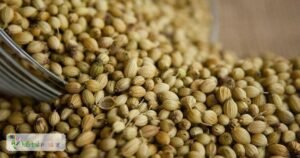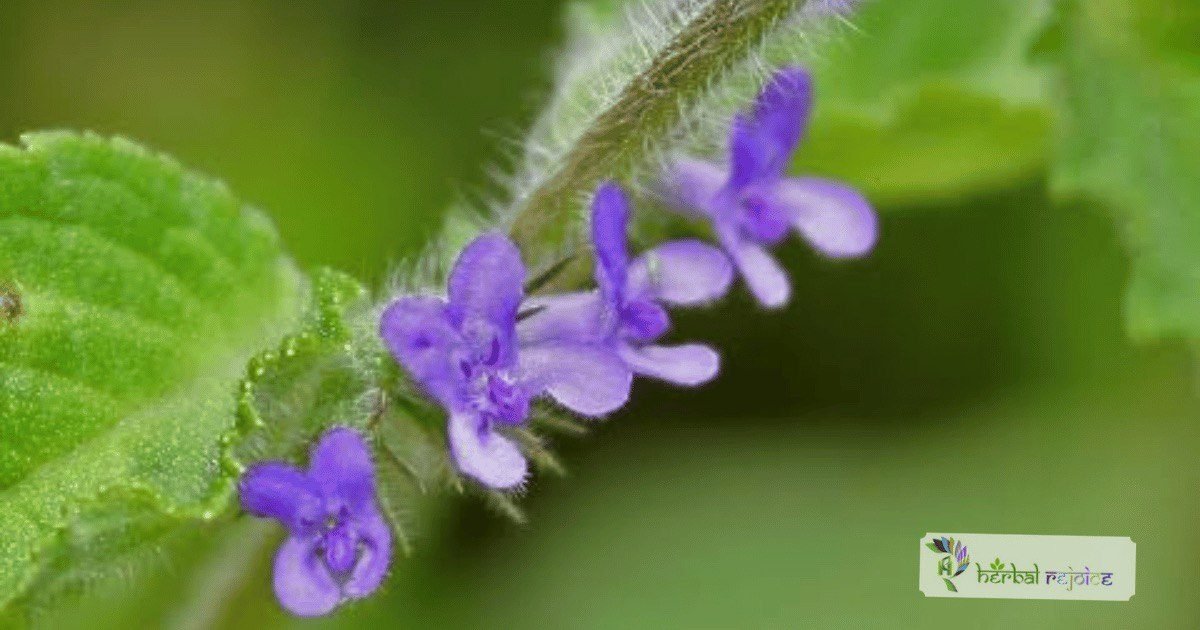Introduction:
Coriandrum sativum Linn., commonly known as Coriander, is a plant belonging to the Umbelliferae/Apiaceae family. It is primarily cultivated in Madhya Pradesh, Maharashtra, Rajasthan, Andhra Pradesh, Tamil Nadu, Karnataka, and Bihar. It is used to stimulate digestion, relieve stomach discomfort, alleviate gas, bloating, promotes urine production and to treat gastroenteritis and measles. By exploring its unique properties and chemical composition, we aim to highlight the remarkable health potential that Coriander offers.
Coriander – The Perfect Seasoning

Names and Habitat of Coriander
Coriandrum sativum, commonly known as Coriander, belongs to the Umbelliferae/Apiaceae family. It is cultivated primarily in regions such as Madhya Pradesh, Maharashtra, Rajasthan, Andhra Pradesh, Tamil Nadu, Karnataka, and Bihar.
Traditional Uses and Medicinal Benefits Of Coriander
Coriander has a long history of traditional usage in various medicinal systems.
1. Stimulant, Stomachic, and Carminative Properties:
Coriander is known for its stimulant, stomachic, and carminative properties. It can help stimulate digestion, relieve stomach discomfort, and alleviate gas and bloating.
2. Antispasmodic and Diuretic Effects:
Coriander exhibits antispasmodic properties, making it potentially beneficial in relieving muscle spasms. It also acts as a diuretic, promoting urine production and aiding in flushing out toxins from the body.
3. Hypoglycemic and Anti-inflammatory Effects:
Studies have suggested that Coriander may have hypoglycemic properties, helping to lower blood sugar levels. Additionally, it exhibits anti-inflammatory effects, which can potentially provide relief from inflammation-related conditions.
4. Bactericidal and Larvicidal Effects:
Coriander oil has been found to possess bactericidal and larvicidal properties. It can help combat bacterial infections and act as a natural insecticide against larvae.
Other Traditional Uses:
In China, Coriander has been used as a remedy for measles, diabetes, aerophagy (excessive swallowing of air), and gastroenteritis. It is also a key ingredient in various herbal preparations in Ayurveda, Unani, and Siddha medicine.
Chemical Composition and Key Components of Coriander
Coriander contains several chemical compounds that contribute to its potential health benefits.
1. Volatile Oil and its Constituents:
Coriander contains 0.5-1% volatile oil, primarily composed of delta-linalool (55-74%), alpha-pinene, and terpinine. These compounds contribute to the aromatic profile and potential therapeutic effects of Coriander.
2. Flavonoids, Coumarins, and Phenolic Acids:
Coriander is rich in flavonoids, coumarins, and phenolic acids, including caffeic and chlorogenic acid. These compounds possess antioxidant properties and may contribute to the overall health benefits of Coriander.
3. Choline and Cholinomimetic Effects:
The roasted seeds of Coriander contain significant amounts of acetylcholine and its precursor choline. Choline has shown usefulness in preventing and treating certain liver disorders. Experimental studies have shown cholinomimetic effects of Coriander extract.
Potential Health Benefits Of Coriander
Coriander and its components hold promising potential for various health benefits.
1. Digestive Aid and Appetite Stimulant:
Coriander’s stomachic and carminative properties make it beneficial for improving digestion and relieving dyspeptic complaints. It may also help stimulate appetite in cases of appetite loss.
2. Blood Sugar Management:
The hypoglycemic effects of Coriander suggest its potential role in managing blood sugar levels. However, further research is needed to fully understand its mechanisms and effectiveness.
3. Anti-inflammatory Support:
Coriander’s anti-inflammatory properties may provide relief from inflammation-related conditions such as arthritis and inflammatory bowel diseases. However, more research is required to validate these effects.
4. Antibacterial and Larvicidal Effects:
The bactericidal and larvicidal properties of Coriander oil make it a natural agent for combating bacterial infections and acting as an insect repellent.
Conclusion:
Coriandrum sativum Linn., commonly known as Coriander, offers unique properties and potential health benefits. Its stimulating, carminative, and diuretic effects, along with its hypoglycemic and anti-inflammatory properties, highlight its medicinal value.
Additionally, Coriander shows bactericidal and larvicidal effects. Incorporating Coriander into a balanced diet and lifestyle may provide natural support for digestive health, blood sugar management, and inflammation-related conditions.
By embracing the remarkable properties and chemical composition of Coriander, individuals can explore the potential health benefits it has to offer.
Frequently Asked Questions (FAQs):
What is the scientific name for Coriander?
The scientific name for Coriander is Coriandrum sativum Linn.
In which regions is Coriander primarily cultivated?
Coriander is primarily cultivated in regions such as Madhya Pradesh, Maharashtra, Rajasthan, Andhra Pradesh, Tamil Nadu, Karnataka, and Bihar.
What are the traditional uses of Coriander in medicine?
Coriander has been traditionally used for its stimulant, stomachic, and carminative properties. It is also known for its antispasmodic, diuretic, hypoglycemic, anti-inflammatory, bactericidal, and larvicidal effects.
Does Coriander stimulate digestion?
Yes, Coriander is known for its stimulant and stomachic properties, which can help stimulate digestion and relieve stomach discomfort.
Can Coriander help with gas and bloating?
Yes, Coriander’s carminative properties can help alleviate gas and bloating.
Does Coriander have diuretic effects?
Yes, Coriander acts as a diuretic, promoting urine production and aiding in flushing out toxins from the body.
Does Coriander have anti-inflammatory effects?
Yes, Coriander exhibits anti-inflammatory effects, which may provide relief from inflammation-related conditions.
Is Coriander beneficial for blood sugar management?
Coriander has shown hypoglycemic effects and may have potential in managing blood sugar levels.
Does Coriander have antibacterial properties?
Yes, Coriander oil has bactericidal properties and can be used to combat bacterial infections.
Can Coriander act as an insect repellent?
Yes, Coriander oil has larvicidal effects and can act as a natural insect repellent.
What are the key components of Coriander?
Coriander contains volatile oil, flavonoids, coumarins, phenolic acids, and choline, among other components.
Can Coriander help improve digestion and stimulate appetite?
Yes, Coriander’s stomachic and carminative properties can aid digestion and stimulate appetite in cases of appetite loss.
Is Coriander effective for managing blood sugar levels?
Coriander shows potential for blood sugar management, but further research is needed to understand its effectiveness fully.
Can Coriander help with inflammation-related conditions?
Coriander’s anti-inflammatory properties may provide relief from conditions such as arthritis and inflammatory bowel diseases.
How can Coriander be used as an antibacterial agent?
Coriander oil can be used topically as an antibacterial agent for treating bacterial infections.
Is Coriander safe for consumption?
Coriander is generally safe for consumption when used in culinary amounts.
Are there any side effects of using Coriander?
Coriander is generally well-tolerated, but some individuals may experience allergic reactions or gastrointestinal discomfort.
Can Coriander be used during pregnancy and breastfeeding?
Pregnant or breastfeeding individuals should consult a healthcare professional before using Coriander medicinally to assess potential risks and benefits.
Can I grow Coriander at home?
Yes, Coriander can be grown at home in pots or a garden bed with suitable soil and sunlight conditions.
Where can I purchase Coriander or Coriander-derived products?
Coriander and Coriander-derived products can be found in grocery stores, health food stores, and online retailers. Make sure to choose reputable sources for quality and authenticity.





